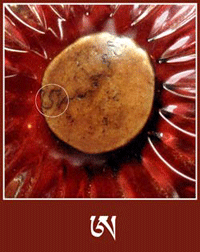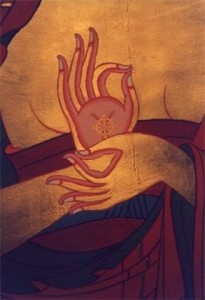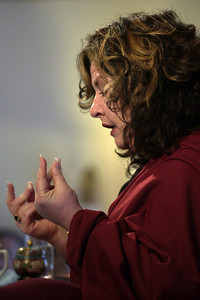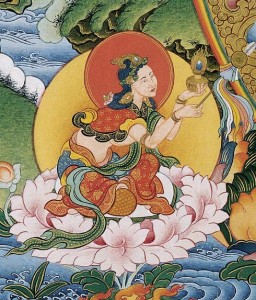
An excerpt from a teaching called Walk the Talk – Ethics by Jetsunma Ahkon Lhamo, June 8, 1994
How do ethics come about in our personal lives? Study sociology and you can find out how ethics evolved in our society. Study developmental psychology and you can find out how ethics developed within us as individuals. I would like to focus on that a little bit so that we can relate to it as individuals.
How many of you remember something about your teenagerhood? If you remember much about your ‘teenagerhood’, and you if you ask your parents, they will agree with you; that was the time when you were most disgusting and obnoxious. Most parents will think that their teenagers really should be put to sleep when the hormones start raging and put in stasis and reawakened later on. As a parent, I can certainly see the wisdom of that.
That’s one shining example. When you finally left your teenagerhood, did you look back at yourself and think, “My God, I was the most selfish creature that ever walked on the face of the earth. I was completely selfish.” No, because it is normal at that age. When you are a teenager it is as though biologically, physically, and a little bit of your mental and emotional development has started to take on the image of an adult. Your body is changing, your mind is changing, the heart is changing, everything is changing, but it is all in flux. Your hormones are going crazy. Your body does not look the same from one week to the next; it is doing things underneath you that you do not understand, and so you are not in total agreement with your body at all times. Your emotions are raging. You have found out about all the things that you can have in the world and the forbidden fruits are suddenly becoming more reachable. You have just figured out that you can say no and you are big and tall enough now to get away with it. You know how to walk away. You know how to run. You can learn how to drive a car. There are all kinds of power that you have that you did not have before. But what you do not have as a teenager is the emotional maturity to deal with it. You have all kinds of power and new things that you can do and a new body to do it with and none of it is under control. Basically, as a teenager, you are out of control. Your mind is out of control. You are not mindful. You are not conscious of your environment. You are not aware of what other people think or what other people feel. You are simply absorbed in these raging developments that are happening in your body and in your mind.
What begins to happen as you move out of teenagerhood is that you go through a lot of pain. Do you remember how painful your teenagerhood was? It is an extremely painful time. Once again you found out about all the things in samsara that you can have, but you also found out that you couldn’t have them all. The minute you found out about sex you found out not everybody wants it with you. And when most people do want it with you, you find out that there are definite drawbacks. There are all kinds of things that happen. Basically you are an older version of what happens in the terrible twos, when two year olds learn how to say no. They did not know how to say that before, but at two, they can say no. And it seems to have some effect on the world and they are giddy with the realization of this. That is actually what happens to teenagers. They are simply giddy with what they can get away with. If they can get away with a lot, if the parents do not have the strength to control or help them or if the parents are out to lunch, the kids are down the road in destructionville, setting themselves on fire because they can say no, again. That is the big realization that has come into their lives. They can say no. So, they are going to say no to everybody.
What happens as you begin to leave this really lousy age? Nobody is exempt. I was very selfish as a teenager. And I felt I knew it all, too. I was supremely omniscient until the age of about 21 when I realized there were others that had thoughts as well. That is just how it is when you are a teenager. You know everything. You have had your first rudimentary thinking process as your tiny little brain buds begin to develop a little growth, and so, at that point it is a big deal. Then when you realize that other people are having complete thought processes, thinking in total equations, you realize were not doing that at all. At that point, you are turning 20 or 21. This is not a joke. This is what happened to you. Can you remember? You are just beginning to rise from the primordial ooze around the age of 20 or 21.
Often at that point, kids that are well raised and basically fundamentally secure, happy in their homes and have good communication with their family, look at their parents and say, “Ooh. Sorry.” They really do. They look at their parents and say, “Gee, I was a real jerk for five years.” And the parent says, “Yes” and it is all made well.
That particular growth process is extremely important, because teenagerhood is filled with suffering. Do you know what the suffering is about? The suffering is less about raging hormones than we think. It is actually more about the fact that these poor sentient beings do not have the capacity at that age, to have or hold to any kind of ethical system. They do not have the capacity really even to see or sense what other sentient beings are experiencing or to empathize sufficiently to be able to gauge their own behavior. One of the things that happens at about 20 or 21 is that it actually dawns on the person that they have been hurting others. They actually learn from hurting their parents. Unfortunately, as parents, you have to understand that. If you have teenage children, one of the things that you have to commit to; that they are going to do as teenagers, is hurt you. It is necessary. It does not mean you let them get away with it, because if you do, you are both dead. They are going to go down into self-destruct land and you are going to go down in to schmuckland, not able to ever relate to your child in a strong way. You do not let them get away with it. You have to have firm discipline. Those of you who are parents who do not have firm discipline in your homes, will know about it now, because if your kids are old enough, they are already out of control and it was because you did not have firm discipline. It’s really cute to be that way with your kids when they are younger, but when they are teenagers, they must have the habit of firm discipline or they will not be able to manage, and you will not be able to help them. Because when they are teenagers, they are going to hurt you and if you are not in control, they are going to hurt you badly. And it is what they need to do. That does not make them bad people. They are not different from you. They simply have to do that to learn. They have to learn by your response. They are going to learn. When they crumble, when they watch you cry for them, when they watch you come back at them with the same vengeance they came at you with, or whatever it takes. They are like little computers, taking that in. I mean, some of them are not little computers and they are still kids. If you can imagine they are almost like little creatures that are learning the size of the room they are in by throwing things against it, seeing how long it takes to bounce back. It is not so different, again, from the baby in the highchair that we all know and love, who loves to drop his fork or his spoon or his food just to see how long it takes to get to the floor and how long it takes you to pick it up. They need to do that. It is about learning.
That is what teenagers do, and at that point, they come up with rudimentary ethics. We learn ethics through our own pain. As teenagers you learned ethics through seeing other people hurt. You learned them through watching. What really happened was when you were a teenager, you got hurt; you got blistered by what you saw. May not be when you were 21, it may have taken you a while longer, but at some point you decided it is not good when people hurt me. But later that comes to mean I cannot hurt anybody either. But it really starts right around that time of teenagerhood and it starts by watching how the world responds to what you’re dishing out.
Copyright © Jetsunma Ahkon Lhamo. All rights reserved







